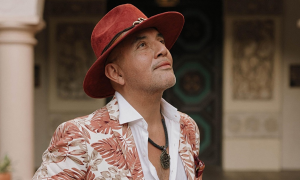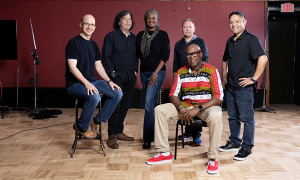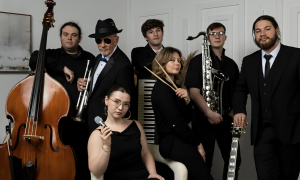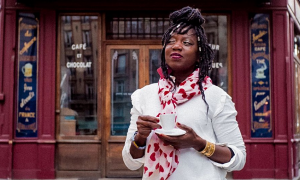Home » Jazz Articles » Take Five With... » Take Five with Machrijam
Take Five with Machrijam
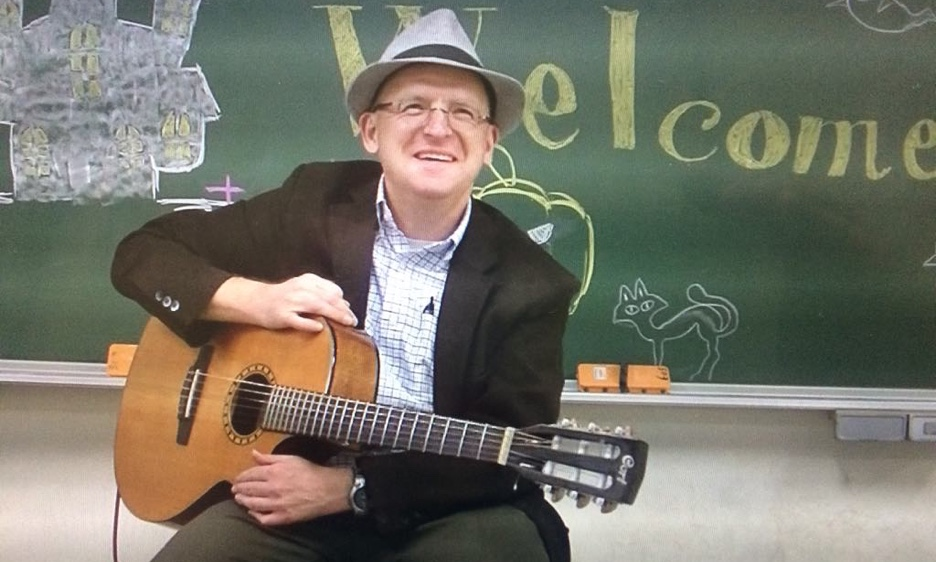
Machrijam is my artist name. Martin Connolly my daily one. I'm from Belfast, Ireland. I've been resident in Japan since early 1990s. Married. Two sons, both taller than me. As for my present status, I'm a professor at a university in Yokohama, Japan. I have published on James Joyce, medieval literature & contemporary Irish lit, plus in other areas (including Star Trek & Pirates of the Caribbean). I've also published a number of works of creative writing, novel, poetry, stories with Snowchild Press. I released Machrijam, my debut album in 2015. I'm a solo artist. All my compositions are original. I just make stuff up.
Instrument(s):
I play an Ibanez nylon GA37STCE, a Gibson Les Paul Studio (circa 1991), a Fender Japan Stratocaster & an Aria Dreadnought Acoustic AD-50N (which is a sublime replica of a Martin D-28. Indeed, I played a 28 in a store once and found it not as good as my Aria). I also have others, plus a guitar synth... but we're not speaking at the moment.
Teachers and/or influences?
My teachers? My piano-playing father, a natural musician if ever there was one. My guitar-playing brother, Jim, after whom my jazz website is named: Jim's Garage.
Influences?

Larry Coryell
guitar1943 - 2017

John McLaughlin
guitarb.1942

Jaco Pastorius
bass, electric1951 - 1987

Paco de Lucia
guitar1947 - 2014

Rory Gallagher
guitar1949 - 1995

Stevie Ray Vaughan
guitar1954 - 1990
I knew I wanted to be a musician when...
...when I heard my brother Jim play guitar. Then when he formed a band, Arcadia Lake, I knew that music was it. I suppose from the earliest I was curious about the instrument my father had bought Jim and could never resist picking it up. The Da was always playing something melodious, too. It was that kind of environment.
Your sound and approach to music.
In my latest album, Machrijazz, it's all about being honest, pure, uncluttered and melodic. I gravitate to melodies, but I am not always good at capturing these elusive entities. So, in the latest album, I allowed the melody of each song to dictate to me the shape and approach to each piece. I kept all guitar sounds manageable and clean. I used no effects (unless you call reverb an effect). I gave the melody all the space and time it required. In general, having been affected by John McLaughlin's guitar playing from yonks ago, I feel it's important to really hit the strings. It may be softly, but it must be decisive and true. Hard jazz, or a hard feeling in jazz is much preferable to a softly-softly (elevator-style) approach, which I abhor. Tone and feeling-wise, while I was always drawn to intense jazz, or jazz-rock when growing up, I did not want to do that here. I wanted to keep the feeling of the songs accessible and open. There is intensity, but it is not dark or mystical, but rather open and playful, I hope.
Your teaching approach
I don't teach. I couldn't. I tried teaching my kids, both of whom play guitar. They learnt about five chords from me and then they went to YouTube. I have learnt guitar in a manner which is undisciplined and structureless. I kept strumming the strings and playing around with riffs and scales for decades. Decades and decades. I did all the wrong things, repeatedly. And yet I'm glad I did, because I like my playing, and I always have done. If I could teach anyone anything, it would be this: Listen to your instrument more than anything else. Play boldly and with the character you possess. Don't try and play like other people, at least for any extended time. Don't allow learning a structured and famous song to lure you away from the tabula rasa of infinite, endless possibility.
Your dream band
Dream band? I don't believe in such. I've been listening to dream bands all my life. Mahavishnu.

The Beatles
band / ensemble / orchestra
Weather Report
band / ensemble / orchestra
Yes
band / ensemble / orchestra
Steely Dan
band / ensemble / orchestrab.1972
Road story: Your best or worst experience
I played at my university once (as a teacher). It was just me, with pre-recorded backing. It worked. It was rocky as hell. I tried to replicate it a few hours later. It didn't work. Another time, I played at a festival in my town. Not many people listened to me, but it was fun. We occupied the same space, but different universes.
Favorite venue
Nothing quite beats busking. Try outside Shinjuku Station, Tokyo, from 9am. That was fun. Proceeds went to a fund for Nepal, which had suffered an earthquake. A giant van parked nearby and a guy got out and started speaking into a mic about rightwing issues dear to his heart. I turned up my amp and got real rocky. The street is a good place to play jazz and blues! I should also mention Poco a Poco, a little jazz bar in the town where I live, Isehara. I have played there a few times and the owner and the customers are all great and welcoming. They hold regular sessions, and you can hear some great music there. I've played well there on occasion, but have crashed, too... up against the steel wall of having to play with others!
Your favorite recording in your discography and why?
My new album Machrijazz is an improvement on the 2015 eponymous Machrijam album. It's a whole new ball game. It's new jazz, or bebop re-done, with some C&W stuff thrown in. The second track "Two's Company" is a delight. It is melodic and strongly melodic, the lines in it are bold, but sweet. It rocks and rolls, in an elegant sort of way.
What do you think is the most important thing you are contributing musically?
I am contributing my own unique approach, derived from decades of doing the wrong thing, repeatedly. What survived is worth it. It tells the tale that persistence can work. I hope my sounds make the listener feel some warmth and goodness and joy and fun, aspects of life which is too generally too thin on the ground in this sometimes-crazy world.
Did you know...
...I am more of a writer than a musician per se. Well, why put them in competition? I love both, dearly. In the new album, some songs connect to my 2017 novel The Conjuring Cowboy. "Buster in the Saddle" captures the scene in the novel where the hero is riding through the desert in the American Wild West. It's a comedic novel, a little Flann O'Brien-ish, and it derives a fair amount of its energy and oomph from cartoons, and the films of Buster Keaton etc.. Another song, "The Jimmy-Jack Cracker Blues,"which is acoustic and played live, also captures the atmosphere of the story. I have also published poetry. I feel that words can be music, and that music can communicate stories. It's like what they say about time and space: they're interchangeable.
The first jazz album I bought was...
I don't remember, as there are so many from my past. Well, actually, I didn't buy them, but my brothers Jim and Paul did. So, I heard the

Mahavishnu Orchestra
band / ensemble / orchestrab.1971

Miles Davis
trumpet1926 - 1991
Music you are listening to now:
I love to listen to Larry Coryell and am devastated he passed away. He was a fantastic musician, a genius, and a beautiful person. I met him and we even corresponded for a while. Often about literature (James Joyce, my particular research area). He loved Tolstoy and wrote and played an opera based on War & Peace. He was working on creating another guitar opera on Joyce's literature, I think Ulysses, when he passed away. Such sadness. He once praised my song ("Blues for Larry," written for him, on my debut album.) I particularly recommend his live album with

Ron Carter
bassb.1937

George Benson
guitarb.1943
Desert Island picks:
Rory Gallagher Taste Live Taste (Polydor, 1971); Shakti with John McLaughlin Natural Elements (Columbia, 1977); Stevie Ray Vaughan The Essential Stevie Ray Vaughan and Double Trouble (Epic/Legacy, 2002); Yes Yessongs (Atlantic, 1973) Elvis Presley RCA Albums Collection (Sony Legacy, 2016); The Beatles Original Studio Recordings (EMI, 2009).
How would you describe the state of jazz today?
I'm not in the best position to answer that question adequately, being too tied to the music I grew up with, and too obstinate to find out much. However, I regularly attend gigs by famous artists, and have a website dedicated to reporting on each. Invariably, these artists are of the highest calibre and never disappoint. The likes of

John Scofield
guitarb.1951

Mike Stern
guitarb.1953

John Tropea
guitar
Victor Wooten
bassb.1964

Hiromi
pianob.1979
What are some of the essential requirements to keep jazz alive and growing?
Financial appreciation would help. Or just appreciation. In modern mainstream media outlets, jazz musicians don't get the publicity they deserve. Pop music occludes whatever coverage they might get. When a jazz great passes away and is hardly mentioned in the news I feel that mainstream media has failed them and failed the public. To talk about the medium itself, jazz should always have a hard element within it, even when it's a quiet, romantic piece. It should eschew a softening, when that softening is designed to take away the hard element.
What is in the near future?
I have no plans at the moment to do anything more with the guitar than just enjoy it. I suspect my muse will turn me toward the computer keyboard in the not-too-distant future, to type words, not tap out a tune... Recording is not the same as just playing: the two are distinct. I will likely play an up-coming festival, with my Ibanez, two small amps (for surround sound) and a looper. That's a mighty set-up. Played live and with no stress about fashioning an eternal sonic monument.
What is your greatest fear when you perform?
That I'll lose my creativity and just fall into the simple pattern of the bare chords of the song. I play best when I don't really have any clue about what's coming next. The fingers take over. Nervousness intrudes on that precious process.
What song would you like played at your funeral?
Play anything, I won't hear it. But, don't play anything by Adele or Sam Smith. I might wake up and do some damage.
What is your favorite song to whistle or sing in the shower?
I whistle. "Summertime," any version, or Ella's. Or the "Theme from Spartacus," Santana's version, which is a beautiful, beautiful piece.
By Day:
I teach at a university in Japan. I research literature. (To wit, which may of interest to readers, I once published a paper on Paul McCartney and James Joyce.)
If I weren't a jazz musician, I would be a:
I'd be a blues musician. Or a cowboy. Or both.
If I could have dinner with anyone from history, who would it be and why?
James Joyce. I'd like to see if I could drink him under the table.
Have you ever written about music?
Yes, indeed I have. The Conjuring Cowboy is about music in many ways. Plus, in my latest book, Contemporary Bloody Literature, I wrote a long poem about the joy and mystery of vinyl records (getting in a fair few digs at the modern way of streaming and downloading whatever you like). My books are here. Furthermore, I run a jazz website, on which you can find my reports on jazz gigs by top jazz artists, whom I sometimes even get to meet. This website allows me to share my love of jazz with the world, and hopefully provides visitors with often highly detailed accounts of players' performances. There is also a page showing photographs I took of legendary jazz players (Miles,

Cab Calloway
composer / conductor1907 - 1994
Tags
Comments
PREVIOUS / NEXT
Support All About Jazz
 All About Jazz has been a pillar of jazz since 1995, championing it as an art form and, more importantly, supporting the musicians who make it. Our enduring commitment has made "AAJ" one of the most culturally important websites of its kind, read by hundreds of thousands of fans, musicians and industry figures every month.
All About Jazz has been a pillar of jazz since 1995, championing it as an art form and, more importantly, supporting the musicians who make it. Our enduring commitment has made "AAJ" one of the most culturally important websites of its kind, read by hundreds of thousands of fans, musicians and industry figures every month.






 Buy Now
Buy Now






